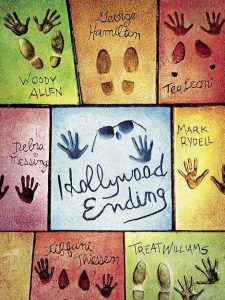
Now that Woody Allen’s latest has arrived on video, it is time to come clean and reveal a disturbing, yet unavoidable truth – Hollywood Ending is Woody Allen’s worst film. Not “in years” or “since that Shadows and Fog thing,” but ever. In fact, while I often say that average Woody is better than most films in a given year, this one ranks as a stinker by any means of comparison. And, given that Woody is the director I love the most, even after all these years, it hurts even more to admit that he is fading; that this latest product represents a career low for both screenplay and execution. Hollywood Ending isn’t just embarrassing; it’s astoundingly unfunny from start to finish. There is not one laugh to be found, not even a chuckle. Believe me, I never thought I’d say that about a Woody film, but there it is. He has made his Ishtar.
Woody plays Val, a washed-up and once-great filmmaker (yikes, a little to close to home this time around) who is given the opportunity to make one last picture by his ex-wife Ellie (Tea Leoni, in yet another lifeless performance). In the course of shooting, Val loses his sight as a result of an extreme psychological reaction. Confiding only in his agent (and later Ellie), he attempts to pull off the impossible – continuing to direct as a blind man without anyone else finding out. The premise (as I read it at the time) was full of comic possibilities, both as farce and an indictment of a Hollywood so shallow that no one would notice if the filmmaker couldn’t see.
With the product as bad as it is year after year, yet another incompetent mess would fit right in, right? Nevertheless, the opportunity for a classic (hell, I would have accepted passable) comedy was wasted at every turn. The jokes fall flat (and sound as if they were written years ago, they are that lacking in topicality), the performances are strained and often pathetic (Woody himself overacts wildly), and any attempts at satire are so off the mark that I wonder what Hollywood is being lampooned.
And another thing: normally I have not cared about Woody’s insistence on casting love interests that are thirty to forty years his junior, but this time I was, I admit, quite disgusted. Maybe I was in a sour mood because the film was such a major disappointment, but I cringed every time I contemplated the line-up of women I was asked to accept as Woody’s harem: Leoni herself (dull, but attractive in a sophisticated way and certainly the sort of woman who would crush Woody beneath her boot heel), Debra Messing (a young hard body rumbling in the sheets with a decrepit old man? Not even if Woody were a Rockefeller), and in a particularly revolting scene, Tiffani-Amber Thiessen as a desperate young actress hoping to catch a break. The scene with Thiessen, where she attempts to seduce Val while he is still blind, just might qualify as kiddie porn in some states, and it certainly remains one of the most obscene incidents in Woody’s otherwise brilliant career.
As the story grinds to its conclusion, Val’s film is a bomb (yet is a hit in France, hee-hee), Val regains his sight, and Ellie returns to Val’s waiting arms. They jet off to Paris together in order to fulfill the inevitability (and fantasy) of the film’s title. A send-up of such outrageous tidiness? Perhaps. Still, one must believe that the end sequence is meant to be taken literally, as the film’s understanding of the Hollywood scene is as outdated as it is wrongheaded. After all, to ridicule Hollywood these days is like shooting fish in a barrel, which means that the standards for satire have been raised considerably. Where sophistication and subtle wit are required, Woody gives up cheap (and obvious) shots with the sort of humor best enjoyed by fans of Sid Caesar, Red Skelton, and other “comedians” of the 2X4-to-the-head variety.
Let it be said, however, that Woody Allen will survive. Perhaps his better days are behind him, and perhaps he no longer has the courage to make a straight drama (I long for the greatness of Interiors or Another Woman), but the odds are against him making a film this bad again. If Crimes and Misdemeanors and Manhattan are the peak of his career, this most certainly is the nadir, and remember, even Stanley Kubrick had his Killer’s Kiss. As a final note, perhaps as an open letter to Woody himself, I would strongly suggest that while the inexplicable Soon-Yi has apparently given him the desire to feel young again (with an emphasis on broad, farcical comedy), it is vital that he grow up, ditch the broad, and give his fans the moral dilemmas, tangled relationships, and cinematic sophistication we all crave. Please, before it’s too late.
Ruthless Ratings:
- Overall: 3
- Acting: 4
- Directing: 5
- DVD Extras: On a Woody film? You’d be lucky to get a chapter search.
- Re-watchability: 2